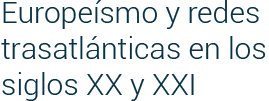
This research area includes three activities: studying the transatlantic networks which were created within the Catholic Church and their influence in the European integration process; studying ecumenical transatlantic networks and determining their weight in the European integration process; finally, studying the impact of the confessional factor on the creation of Christian youth organisations and the incipient development of cultural tourism, which highlighted the importance of the heritage of Western religious confessions.
Transatlantic networks and Europeanism in the Catholic Church (1920-1960)
The cooperation of the National Catholic Welfare Conference (North America) with the various European Catholic Churches after World War I became much more important when it came to fighting against the Nazi and the Communist totalitarian regimes, resulting in a series of events which had a strong impact on Europe: the creation of internationalist youth and women’s organisations, the promotion and the financial support of a number of social-Catholic initiatives, the emergence of political parties related to Christian democracy… The relations between Pax Romana (Fribourg, 1921), the Catholic Association for International Peace (New York, 1927) and the Swiss Confederation –which became, once again, a testing ground– paved the way for the subsequent emergence of Pax Christi (1945), the International Movement of Catholic Intellectuals (1946) and the Nouvelles Équipes Internationales (1947), which played a decisive role in the implementation of Christian democratic policies.
Investigator-in-charge
José Ramón Rodríguez Lago
Researchers
- Valladolid: Heidi Senante Berendes, Victor Gavín
- Vigo: José Ramón Rodríguez Lago, Natalia Núñez-Bargueño, Santiago de Navascués Martínez, João Miguel Almeida
Results of research
Transatlantic networks and Europeanism in ecumenical currents (1920-1960)
The progress made by ecumenism in the Protestant communities of both sides of the Atlantic in the first third of the 20th century, along with the threat posed by totalitarian regimes in the following years, contributed to the progressive incorporation of Catholics to this process, always under the close supervision of the Vatican. This process significantly influenced the creation of Christian democracy and the achievement of relative unity against a common rival: totalitarian regimes.
Investigator-in-charge
José Ramón Rodríguez Lago
Researchers
- Valladolid: Heidi Senante Berendes, Victor Gavín
- Vigo: José Ramón Rodríguez Lago, Natalia Núñez-Bargueño, Santiago de Navascués Martínez, João Miguel Almeida
Results of research
The influence of transatlantic networks and the confessional factor in the evolution of youth organisations and cultural tourism in Europe
The transatlantic networks created in the context of the cultural Cold War, as well as their confessional wing, tried to respond to the Communist narrative of the “new man” in two different ways. First, in order to combat the creation of youth organisations that had been taught atheist principles and were familiar with the destruction of religious symbols, they tried to make young people identify the Christian values with those of the Western culture. Moreover, they made an effort to revalue ecclesiastical heritage, turning it into a major tourist attraction. The International Union of Students (founded in Prague in 1947), the first World Festival of Youth and Students (also held in Prague in 1947) and the various confessional youth organisations played a key role in the fight against Communism. Furthermore, the cultural Cold War promoted confessional tourism, which not only facilitated transatlantic exchange but also ecumenical cooperation against the common enemy. Both lines of action were closely related to the promotion of a specific type of holiday which was clearly aimed at creating a Christian and Western European identity.
Investigator-in-charge
José Ramón Rodríguez Lago
Researchers
- Valladolid: Heidi Senante Berendes, Victor Gavín
- Vigo: José Ramón Rodríguez Lago, Natalia Núñez-Bargueño, Raquel Lázaro Vicente, João Miguel Almeida
Results of research
